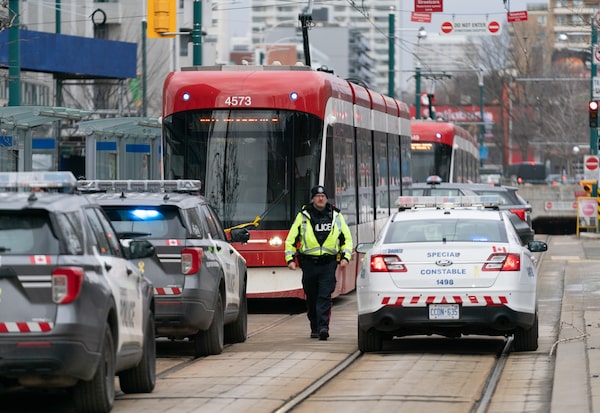
Toronto's transit system has seen a number of violent attacks in recent days, as political, transit and police leaders vow to make the system safer.The Canadian Press
Toronto police promised Thursday to beef up their presence immediately on the city’s transit system after a spate of violent incidents that have rattled public confidence.
Police Chief Myron Demkiw joined Toronto Transit Commission CEO Rick Leary and Mayor John Tory to announce that as many as 80 more officers would be patrolling the TTC daily.
“The TTC must be safe for everyone, without exception, the people who use it and the people who provide the service,” Mr. Tory said. “I know many people who use the TTC, the passengers, are anxious and even scared. And they must know that we are doing everything we can that will be helpful to address their concerns and to make sure everyone remains safe.”
The incidents have raised public fears at a time the agency is struggling to regain riders that have quit since the start of the pandemic.
Chief Demkiw said the additional patrols would be done primarily by off-duty officers earning overtime, to leave the regular force available for other duties. He said it was too early to know how much this might cost and that police are prepared to increase their presence if required.
This announcement was made after two stabbings over two days, each of which sent a passenger to hospital. Also, according to police, since the weekend two TTC employees have been assaulted, two chased by someone holding a syringe and one shot with a BB gun. None sustained serious injuries.
The recent incidents follow a number of high-profile acts of violence on the TTC. A woman was fatally stabbed in December on a train. A woman survived after being pushed onto the tracks in April. And a woman who was lit on fire at a bus stop in June later died of her injuries.
Shelagh Pizey-Allen, executive director of the advocacy group TTC Riders, said it was impossible for her to determine whether there has been an actual increase in serious incidents on transit, or whether the ones that were occurring were getting more attention. But she warned that to the extent this perception scares off riders, it will make the system more dangerous.
“There’s safety in numbers, so if we drive more transit users away from the system, you’re waiting by yourself late at night,” she said. “I have been sexually harassed on transit, it’s always happened late at night when there were very few people around.”
However, Ms. Pizey-Allen questioned the value of adding police, calling it a Band-Aid that doesn’t address the root causes of safety issues on transit.
Her group is planning a public transit safety town hall early next month that will include Marvin Alfred, the head of the main TTC union, as well as representatives of students and social groups, and be moderated by former Toronto Police Services Board chair Alok Mukherjee.
According to TTC figures, the relative number of offences against passengers jumped at the start of the pandemic and remains above pre-COVID levels. In the latest monthly CEO report, released last week, the TTC said there were 1.91 offences against passengers per million boardings in November, down from 2.11 in October. That figure was consistently less than 1 in the years immediately before the pandemic.
The same report said that assaults and thefts were down from October to November while mischief and harassment were up, without giving exact numbers. More detailed data were not immediately available.
Regardless of the data, any public perception that local transit is unsafe poses multiple problems.
No big city can function efficiently without a robust and well-used public transit system. In particular, feelings of risk associated with the TTC could slow the rebound of the city’s downtown, which is crucial for Toronto’s financial future. Many of the area’s employees have historically been transit users. But high-profile incidents might encourage them to work from home or to commute by car, contributing to congestion.
“It’s very rare cases but it’s very scary those cases that have happened, with people being pushed off platforms and other incidents that have happened,” said Toronto Region Board of Trade CEO Jan de Silva.
“I know the TTC, I take the TTC into work. You’re seeing a lot more situations where folks are begging or in distress in the platform, which is concerning.”
At the same time, the TTC is struggling to rebuild a lagging ridership that has devastated its finances and forced Toronto to seek large bailouts from higher levels of government. The most recent figures show the agency at about 70 per cent of its pre-COVID ridership, with full recovery expected to take years.
“Safety concerns could have an impact, but I couldn’t quantify that,” TTC spokesmen Stuart Green said in an e-mail. “Certainly the high-profile safety incidents we’ve seen recently are understandably concerning for customers and employees.”